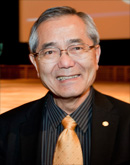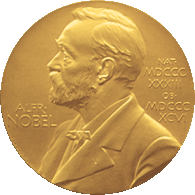Nobel Research

Professor Ei-ichi Negishi was a pioneer in developing metal-based reactions called palladium-catalyzed cross-coupling, that allow for easy and efficient synthesis of complex organic compounds.
By creating a more precise method for coupling two different (or same) carbon groups, Dr. Negishi created a powerful tool for synthesizing a wide range of useful chemicals used in medicine, agriculture, and electronics.
He shared the 2010 Nobel Prize with Richard Heck of the University of Delaware and Akira Suzuki from Hokkaido University in Sapporo, Japan. (Both Negishi and Suzuki studied at Purdue under Professor Herbert C. Brown, a 1979 Nobel Laureate.)
Their methods are now widely used in industry and research in a variety of applications including: pharmaceutical antibiotics that work on drug resistant bacteria, agricultural chemicals that protect crops from fungi, and electronic light-emitting diodes used in the production of extremely thin monitors.
Negishi Coupling

Negishi Coupling explained
(Video courtesy of Purdue Marketing and Media)
Coupling Animation
